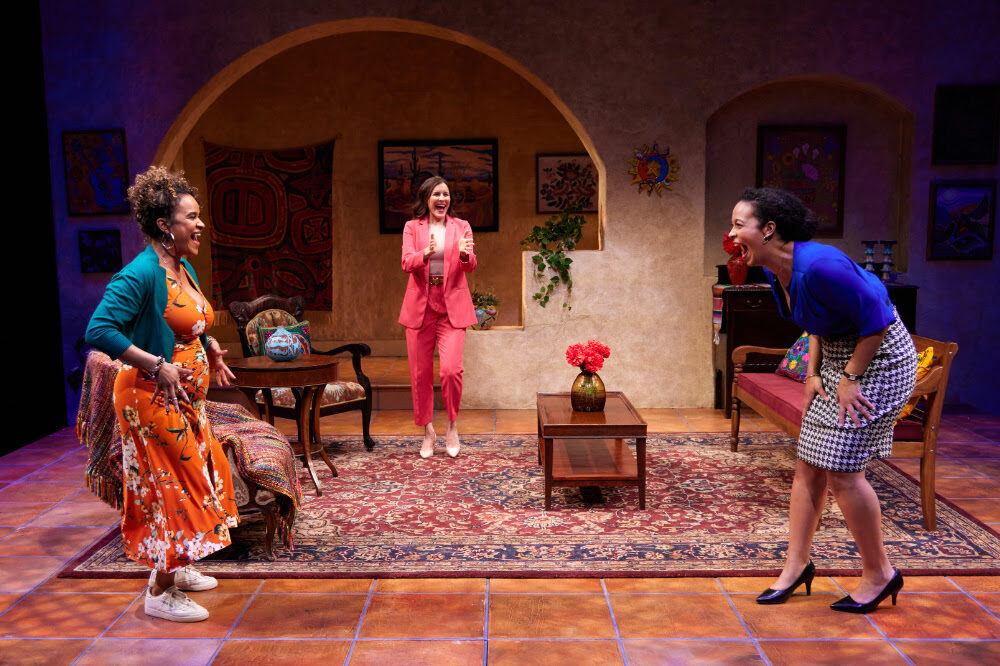Review of Eliana Pipes’ Dream Hou$e, Long Wharf Theatre
The question of heritage gets sounded early in Eliana Pipes’ play Dream Hou$e. Set in the ancestral home of sisters Julia (Darilyn Castillo) and Patricia (Renata Eastlick), the play opens with a glimpse into the tensions governing their lives. Julia is pregnant and visiting back home for the first time in two years; Patricia is recovering from spending that time nursing their mother who died recently. We might not be surprised that these two are ready to put the family house on the market and move on.
To that end, Patricia has signed up for a chance to garner big bucks on an HGTV show called “Flip It and List It,” where the costs of renovations will be covered by the show—unless of course the house doesn’t sell. At which point the sisters will be saddled with the expenses. Already, they’re saddled with the problem of how much they identify with the house—allegedly built by their great-grandfather—and with Hilo Villa. Named for the textile industry formerly centered in the community where they grew up, their old neighborhood is now a rapidly gentrifying and much desired location called Highville.
Currently at Long Wharf Theatre in New Haven, Connecticut, and partnered with Alliance Theatre in Atlanta, Georgia, where the show played earlier this year, and with Baltimore Center Stage in Maryland, where the show goes next, the production is the world premiere of a play that won the Alliance/Kendeda Prize for a new play from an MFA program.
Perhaps trying a bit too much at once, Pipes’ varied play moves through a series of surprises. Playing with the gimmicks of theater and of television, Pipes unmoors us from our initial assumptions about a naturalistic family-centered drama. While themes from the sisters’ childhood and their knowledge (or lack thereof) concerning their ancestors keep returning—sometimes in the abrasive format of a quiz show—the play hosts a barrage of questions about how to appropriate history in an appropriate manner.

Darilyn Castillo as Julia in Dream Hou$e, Long Wharf Theatre; photo courtesy of Long Wharf Theatre
Stephanie Osin Cohen’s set is lovely to look at and has a reality that serves well the kinds of surreality that begin to predominate. Haydee Zelideth’s costumes mark significant changes in attitude well, and the effects that come via sound/music (Paul James Prendergast), lighting (Jason Lynch) and projections (Mark Holthusen) add to the fascinating theatricality of the evening, enhanced as well by four actors, local to each place Dream Hou$e plays, enacting an ensemble of onstage “techs” who abet the play’s mood swings.
Director Laurie Woolery has a penchant for plays with complex situations. I’ve reviewed three plays she directed at the Yale Repertory Theatre—Imogen Says Nothing, El Huracán, and Manahatta—and all three worked through deeply conflicted concepts of time and place, often with an emphasis on how one sense of reality bleeds through to another. Indeed, Pipes’ play feels like a Rep show in the sense that it’s a play that surprises more than it convinces.
Some bits—like the parts involving Marianna McClellan as an avid TV host switching from bedside manner to crass manipulation to ‘bestie’ to nemesis—land with a satiric edge that suggests the sharks circling this little patch of home. More telling are the jabs at the sisters themselves: besides enacting the familiar trope of the sister who stayed and the one who left, they also invoke the get-ahead by assimilating vs. the groping-after-roots rationales that seem to divide every hyphenated U.S. identity. Pipes mocks this split, as when a tech-person puts a flower in Julia’s hair as she begins to evoke an authentic Latina flavor that becomes cliché before our eyes. Soon, the sisters are looking askance at each other’s efforts to “identify” more than is true with a place they both wanted to leave.
And that becomes the main conflict, apart from whether or not their house (discovered to have some creepy problems) will sell: Julia may want to move back in search of the history she wants her unborn child to experience, even as gentrification slowly paves it under; Patricia, meanwhile, dreams of the country club she wants to join somewhere else entirely. One surprise is that Patricia is the more sympathetic character—at least she knows whereof she speaks. Julia seems to exist in some kind of fantasy of a past that never really was, no matter how many little talismans might be recovered from the house during its renovation. Castillo’s Julia seems rarely more than petulant while Eastlick’s Patricia—an accountant proud to be a “professional”—is more intriguingly mercurial.

Darilyn Castillo (Julia), Marianna McClellan (Tessa), Renata Eastlake (Patricia) in Dream House at Long Wharf Theatre; photo courtesy of Long Wharf Theatre
At times the play feels a bit like watching a brainstorming session in which a slew of gimmicks—theater of absurd, magic realism, coup de théâtre, Genet-like psychodrama, and interludes of emotionalism side-by-side with arch irony—flicker across a surface without much depth. Pipes seems uncertain what note to end on, and one wonders if a little internal game-show host isn’t perhaps driving the proceedings toward “crowd-pleasing,” though with an uncertain sense of what “crowd” that might be.
Dream Hou$e isn’t so much about finding a dream home, or creating one, as it is about the uneasy attachments and renovations required by the fluid identities of living in the contemporary U.S.
Dream Hou$e
By Eliana Pipes
Directed by Laurie Woolery
Scenic Designer: Stephanie Osin Cohen; Costume Designer: Haydee Zelideth; Lighting Designer: Jason Lynch; Composer/Sound Designer: Paul James Prendergast; Projection Designer: Mark Holthusen; Stage Manager: Jayson T. Waddell; Assistant Stage Manager: Kevin Jinghong Zhu; Associate Director: Alexis K. Woodard
Cast:
Darilyn Castillo, Renata Eastlick, Marianna McClellan; ensemble: Andrew Martinez, Moira O’Sullivan, Ezra Tozian, Kevin Sisounthone
Long Wharf Theatre
March 15-April 3, 2022
This post was written by the author in their personal capacity.The opinions expressed in this article are the author’s own and do not reflect the view of The Theatre Times, their staff or collaborators.
This post was written by Donald Brown.
The views expressed here belong to the author and do not necessarily reflect our views and opinions.


















